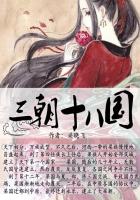"And Helen stood by the coffers wherein were her robes of curious needlework which she herself had wrought. Then Helen, the fair lady, lifted one and brought it out, the widest and most beautifully embroidered of all, and it shone like a star, and lay far beneath the rest."Presently, we read, "Helen of the fair face came up with the robe in her hands, and spake: 'Lo! I too give thee this gift, dear child, a memorial of the hands of Helen, for thy bride to wear upon the day of thy desire, even of thy marriage. But meanwhile let it lie with thy mother in her chamber. And may joy go with thee to thy well-builded house, and thine own country.'"Helen's last words, in Homer, are words of good omen, her prophecy to Telemachus that Odysseus shall return home after long wanderings, and take vengeance on the rovers. We see Helen no more, but Homer does not leave us in doubt as to her later fortunes. He quotes the prophecy which Proteus, the ancient one of the sea, delivered to Menelaus:-"But thou, Menelaus, son of Zeus, art not ordained to die and meet thy fate in Argos, the pasture-land of horses, but the deathless gods will convey thee to the Elysian plain and the world's end, where is Rhadamanthus of the fair hair, where life is easiest for men. No snow is there, nor yet great storm, nor any rain; but alway ocean sendeth forth the breeze of the shrill West to blow cool on men:
yea, for thou hast Helen to wife, and thereby they deem thee to be son of Zeus."We must believe, with Isocrates, that Helen was translated, with her lord, to that field of Elysium, "where falls not hail, or rain, or any snow." This version of the end of Helen's history we have adopted, but many other legends were known in Greece. Pausanias tells us that, in a battle between the Crotoniats and the Locrians, one Leonymus charged the empty space in the Locrian line, which was entrusted to the care of the ghost of Aias. Leonymus was wounded by the invisible spear of the hero, and could not be healed of the hurt.
The Delphian oracle bade him seek the Isle of Leuke in the Euxine Sea, where Aias would appear to him, and heal him. When Leonymus returned from Leuke he told how Achilles dwelt there with his ancient comrades, and how he was now wedded to Helen of Troy. Yet the local tradition of Lacedaemon showed the sepulchre of Helen in Therapnae.
According to a Rhodian legend (adopted by the author of the "Epic of Hades"), Helen was banished from Sparta by the sons of Menelaus, came wandering to Rhodes, and was there strangled by the servants of the queen Polyxo, who thus avenged the death of her husband at Troy. It is certain, as we learn both from Herodotus (vi. 61) and from Isocrates, that Helen was worshipped in Therapnae. In the days of Ariston the king, a deformed child was daily brought by her nurse to the shrine of Helen. And it is said that, as the nurse was leaving the shrine, a woman appeared unto her, and asked what she bore in her arms, who said, "she bore a child." Then the woman said, "show it to me," which the nurse refused, for the parents of the child had forbidden that she should be seen of any. But the woman straitly commanding that the child should be shown, and the other beholding her eagerness, at length the nurse showed the child, and the woman caressed its face and said, "she shall be the fairest woman in Sparta." And from that day the fashion of its countenance was changed, "and the child became the fairest of all the Spartan women."It is a characteristic of Greek literature that, with the rise of democracy, the old epic conception of the ancient heroes altered. We can scarcely recognize the Odysseus of Homer in the Odysseus of Sophocles. The kings are regarded by the tragedians with some of the distrust and hatred which the unconstitutional tyrants of Athens had aroused. Just as the later chansons de geste of France, the poems written in an age of feudal opposition to central authority, degraded heroes like Charles, so rhetorical, republican, and sophistical Greece put its quibbles into the lips of Agamemnon and Helen, and slandered the stainless and fearless Patroclus and Achilles.














